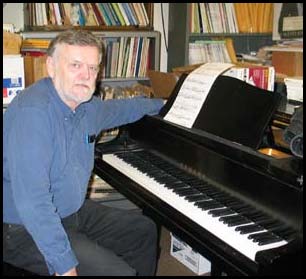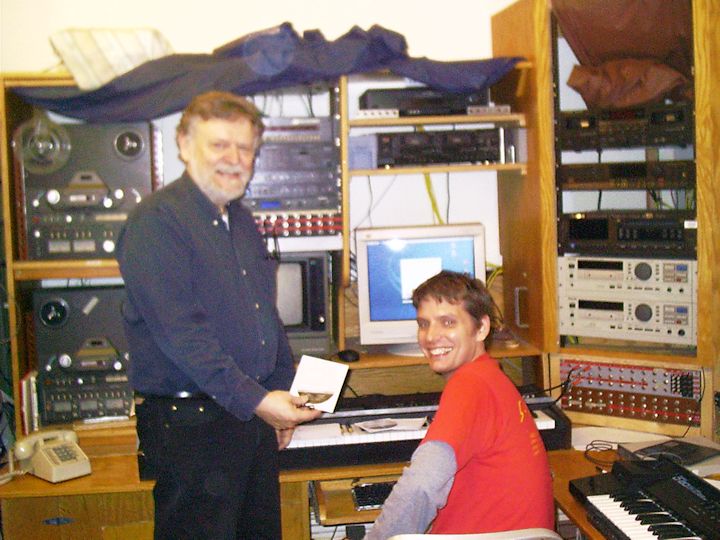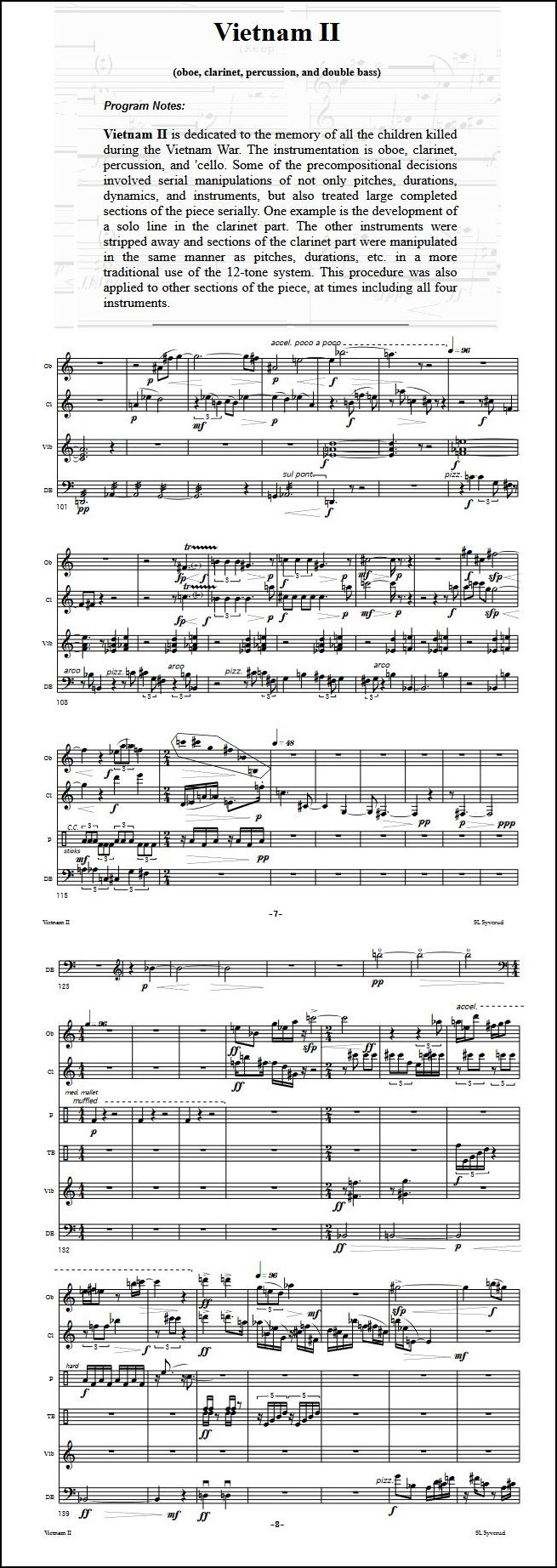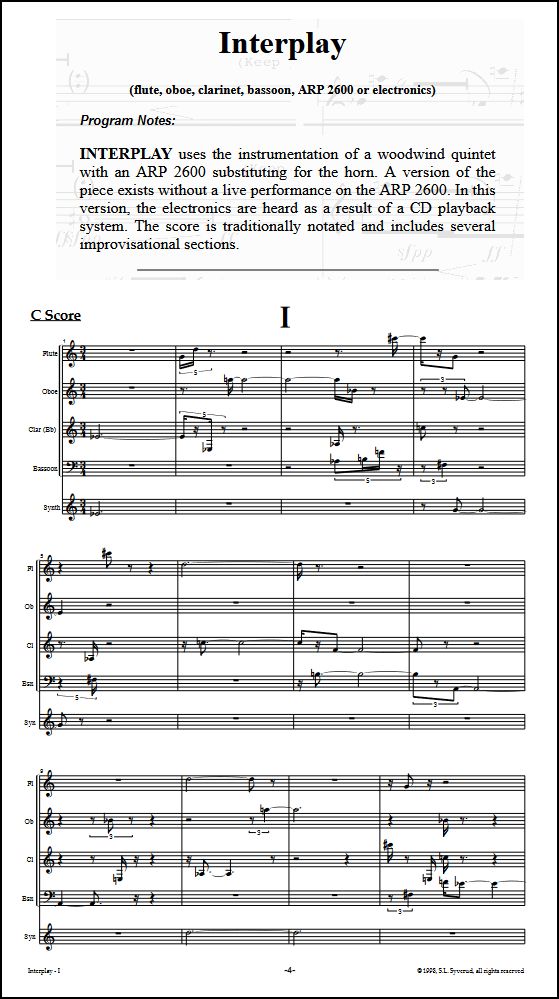

Ph.D: University of Iowa. MA/BA: San Francisco State University. Director: Established the Electronic Music Studios at Northwestern University. Composer-in-Residence: Grinnell College, Jackson State University, University of Wisconsin (Parkside). Compositions published: Seesaw Music, Moro Music, American Composers Alliance. Recordings: Brewster Records. Founding member: Chicago Society of Composers. Member: Society of Composers Inc., Broadcast Music Inc., American Music Center, International Association for the Fantastic in the Arts, Society for Electro-Acoustic Music in the United States, International Computer Music Association. Performer: Chaos, Noyes Players, backGammon. Compositions performed: SCI, SEAMUS Conferences; Universities of Alabama, Iowa, Illinois, Wisconsin (Eau Claire), Wisconsin (Parkside); Bowling Green State University; Memphis State University; Southern Illinois University; Ball State University; Western Illinois University; Radford University; DePaul University; San Francsico State University; Governors State University; Northwestern University; California State University (LA); Roosevelt University; Ithaca College; Grinnell College; Whitman College; Jackson State College; International Festival of the Fantastic in the Arts at Miami; California Institute of the Arts; Tampa Bay Composers' Forum; University of Athens (Greece); Franz Liszt Academy (Budapest) Visiting professor: Franz Liszt Academy, as recipient of J. William Fulbright Foreign Scholarship Board grant. Listed in Who's Who in Music and Musicians' International Directory. == Biography, photos and scores are from the
composer’s
website
|


|
Forbidden Planet's innovative electronic music score, credited as "electronic tonalities", partly to avoid having to pay any of the film industry music guild fees, was composed by Bebe and Louis Barron. MGM producer Dore Schary discovered the couple quite by chance at a beatnik nightclub in Greenwich Village while on a family Christmas visit to New York City; Schary hired them on the spot to compose his film's musical score. While the theremin (which was not used in Forbidden Planet) had been used on the soundtrack of Alfred Hitchcock's Spellbound (1945), the Barrons' electronic composition is credited with being the first completely electronic film score. Their soundtrack preceded the invention of the Moog synthesizer by eight years (1964).
Since Bebe and Louis Barron did not belong to the Musicians Union, their work could not be considered for an Academy Award, in either the "soundtrack" or the "sound effects" categories. MGM declined to publish a soundtrack album at the time that Forbidden Planet was released. However, film composer and conductor David Rose later published a 7-inch single of his original main title theme that he had recorded at the MGM Studios in Culver City during March 1956. His main title theme had been discarded when Rose, who had originally been hired to compose the musical score in 1955, was discharged from the project by Dore Schary sometime between Christmas 1955 and New Year's Day. The film's original theatrical trailer contains snippets of Rose's score, the tapes of which Rose reportedly later destroyed. The Barrons finally released their soundtrack in 1976 as an LP album for the film's 20th anniversary; it was on their very own Planet Records label (later changed to Small Planet Records and distributed by GNP Crescendo Records). The LP premiered at MidAmeriCon, the 34th World Science Fiction Convention, held in Kansas City, MO, over the 1976 Labor Day weekend, as part of a 20th Anniversary celebration of Forbidden Planet held at that Worldcon. The Barrons were there promoting their album's first release, signing all the copies sold at the convention. They also introduced the first of three packed-house screenings that showed an MGM 35mm fine-grain vault print in original CinemaScope and stereophonic sound. A decade later, in 1986, their soundtrack was released on a music CD for the film's 30th Anniversary, with a six-page color booklet containing images from Forbidden Planet, plus liner notes from the composers, Bebe and Louis Barron, and Bill Malone. A tribute to the film's soundtrack was performed live in concert by Jack Dangers, available on disc one of the album Forbidden Planet Explored. |


© 2004 Bruce Duffie
This conversation was recorded in Syverud’s office at Northwestern University on April 14, 2004. Portions were broadcast on WNUR six months later, and again in 2012 and 2019. This transcription was made in 2022, and posted on this website at that time. My thanks to British soprano Una Barry for her help in preparing this website presentation.
To see a full list (with links) of interviews which have been transcribed and posted on this website, click here. To read my thoughts on editing these interviews for print, as well as a few other interesting observations, click here.
Award - winning broadcaster Bruce Duffie was with WNIB, Classical 97 in Chicago from 1975 until its final moment as a classical station in February of 2001. His interviews have also appeared in various magazines and journals since 1980, and he now continues his broadcast series on WNUR-FM, as well as on Contemporary Classical Internet Radio.
You are invited to visit his website for more information about his work, including selected transcripts of other interviews, plus a full list of his guests. He would also like to call your attention to the photos and information about his grandfather, who was a pioneer in the automotive field more than a century ago. You may also send him E-Mail with comments, questions and suggestions.